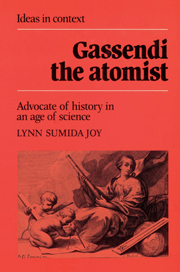Book contents
- Frontmatter
- Contents
- Preface
- List of illustrations
- INTRODUCTION
- 1 Other atomists, other skeptics, and other Epicureans: the problem of determining the context of Gassendi's career
- PART 1 HUMANIST HISTORIOGRAPHY
- PART 2 PHYSICS AND THE HISTORY OF PHILOSOPHY
- List of abbreviations used in the notes
- Notes
- Index of names
1 - Other atomists, other skeptics, and other Epicureans: the problem of determining the context of Gassendi's career
Published online by Cambridge University Press: 01 September 2009
- Frontmatter
- Contents
- Preface
- List of illustrations
- INTRODUCTION
- 1 Other atomists, other skeptics, and other Epicureans: the problem of determining the context of Gassendi's career
- PART 1 HUMANIST HISTORIOGRAPHY
- PART 2 PHYSICS AND THE HISTORY OF PHILOSOPHY
- List of abbreviations used in the notes
- Notes
- Index of names
Summary
Ever since Bernier's popular French translation of his work in the 1670s, Gassendi has had to be defended against an unusual charge, the charge that he was only a historian of philosophy. Scholars have pinned this label to his work not because they did not recognize his skills as a philosopher and scientist but because at a certain point in assessing his philosophical and scientific achievements, they have sought to explain why those achievements do not merit unqualified praise. If Gassendi is significant as a theorizer about atoms, he can be faulted for the apparent naïveté of the experiments he used to test his theories. If he is significant for advancing arguments against Aristotle's metaphysics, he may be counted as just one of a growing number of sixteenth- and seventeenth-century philosophers who were critical of the standard university curriculum. If he is significant as a skeptic during a period of the revival of Pyrrhonian and Academic skepticism in Europe, he suffers from an implicit comparison with his contemporary, Descartes, whose skepticism proved to be more fruitful in the development of modern epistemology than his. However, interpreters of his writings have been reluctant simply to call Gassendi second-rate. The sheer volume, complexity, and scope of his Opera omnia do command a respect which goes beyond the limited acknowledgment of his contributions to empiricism in philosophy and to the newly mathematized physics, both of which captivated the attention of intellectuals in the half-century after his death in 1655.
Information
- Type
- Chapter
- Information
- Gassendi the AtomistAdvocate of History in an Age of Science, pp. 3 - 22Publisher: Cambridge University PressPrint publication year: 1988
